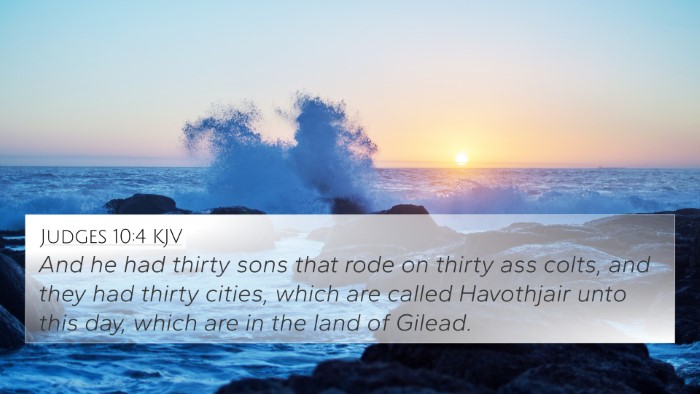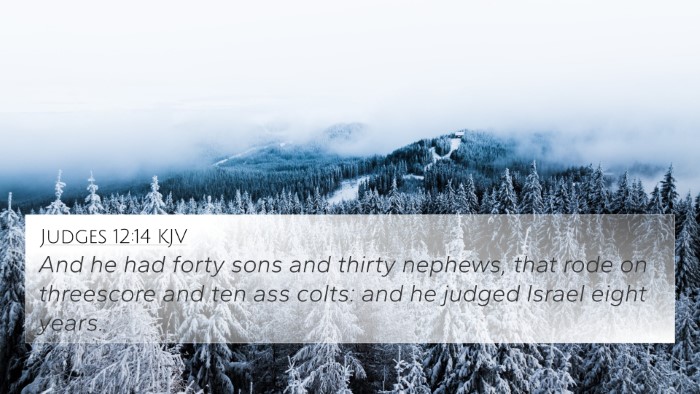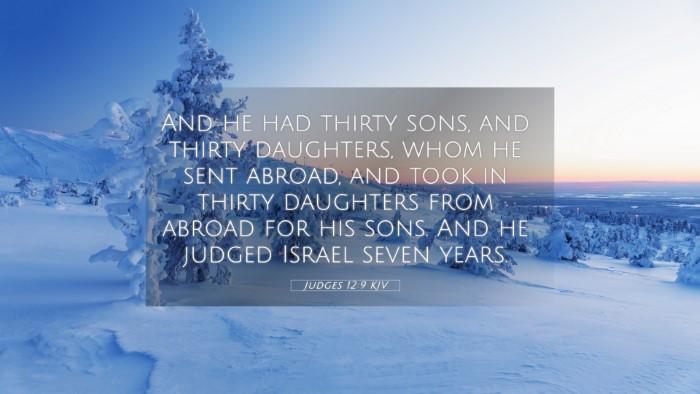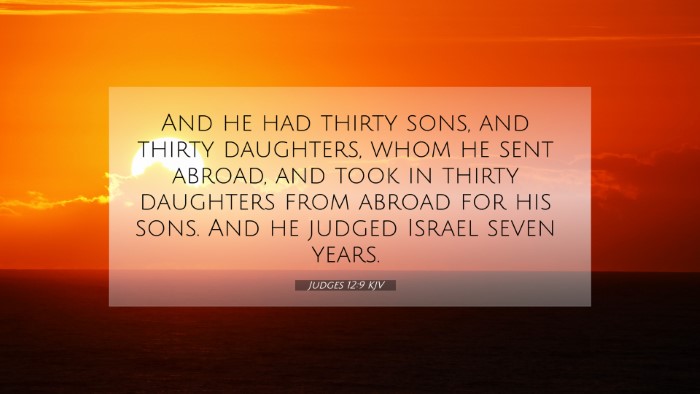Old Testament
Genesis Exodus Leviticus Numbers Deuteronomy Joshua Judges Ruth 1 Samuel 2 Samuel 1 Kings 2 Kings 1 Chronicles 2 Chronicles Ezra Nehemiah Esther Job Psalms Proverbs Ecclesiastes Song of Solomon Isaiah Jeremiah Lamentations Ezekiel Daniel Hosea Joel Amos Obadiah Jonah Micah Nahum Habakkuk Zephaniah Haggai Zechariah MalachiJudges 12:9 Similar Verses
Judges 12:9 Cross References
And he had thirty sons, and thirty daughters, whom he sent abroad, and took in thirty daughters from abroad for his sons. And he judged Israel seven years.
Uncover the Rich Themes and Topics of This Bible Verse
Listed below are the Bible themes associated with Judges 12:9. We invite you to explore each theme to gain deeper insights into the Scriptures.
Judges 12:9 Cross Reference Verses
This section features a detailed cross-reference designed to enrich your understanding of the Scriptures. Below, you will find carefully selected verses that echo the themes and teachings related to Judges 12:9 KJV. Click on any image to explore detailed analyses of related Bible verses and uncover deeper theological insights.

Judges 10:4 (KJV) »
And he had thirty sons that rode on thirty ass colts, and they had thirty cities, which are called Havothjair unto this day, which are in the land of Gilead.

Judges 12:14 (KJV) »
And he had forty sons and thirty nephews, that rode on threescore and ten ass colts: and he judged Israel eight years.
Judges 12:9 Verse Analysis and Similar Verses
Understanding Judges 12:9: A Comprehensive Analysis
Judges 12:9 states: "And he had thirty sons that rode on thirty ass colts, and he had thirty daughters, whom he sent abroad, and took in thirty daughters from abroad for his sons. And he judged Israel seven years." This verse provides insights into the lineage and leadership qualities of Jephthah, who played a critical role in delivering Israel from the Ammonites during a tumultuous period.
Verse Context and Overview
In the broader narrative of the Book of Judges, Chapter 12 details Jephthah’s lineage, achievements, and the lasting impact of his leadership. The verse emphasizes the importance of family, authority, and the socio-political dynamics of the time.
Character Analysis of Jephthah
Jephthah’s character is significant and multi-faceted. By noting that he had thirty sons and thirty daughters, the verse illustrates his capacity not only as a warrior but as a patriarch. The numerical detail indicates wealth and status among the Israelites.
- Patriarchal Role: Jephthah’s role as a father reflects the ideal of strong family leadership prevalent in Hebrew culture.
- Political Authority: His ability to send and receive daughters highlights political alliances and social ties crucial to leadership.
- Judgment Period: The mention of his seven-year judgeship underscores his authority and the trust placed in him to lead Israel.
Thematic Connections and Cross-References
This verse serves as a bridge to several themes found within the broader scriptural context. Below are notable cross-references that help provide a deeper understanding:
- Judges 11:1-11: The background of Jephthah's rise to prominence and his initial conflict with the Ammonites.
- Genesis 24:3: Family alliances through marriage, reflecting social structures similar to those used by Jephthah in forming ties with foreign daughters.
- 1 Chronicles 7:6-7: The genealogy of Manasseh, illustrating the importance of lineage and family ties in Israelite history.
- Proverbs 17:6: "Children’s children are the crown of old men," reinforcing the value of family and descendants in the biblical narrative.
- 1 Samuel 8:5-7: The transition of Israel from judges to kings, highlighting the socio-political evolution that Jephthah’s judgeship reflects.
- Matthew 1:5: The genealogy of Jesus, where women’s names are mentioned in this light, mirroring the importance of family ties in achieving divine purposes.
- Luke 3:33: Another genealogy stressing the importance of lineage, connecting the earthly heritage to spiritual significance.
Inter-Biblical Dialogue and Insights
Through these connections, we can see:
- Family as a Theme: Throughout the Scriptures, families often serve as vessels for God's plans.
- Community Relations: The alliances formed through marriages reflected on how communities thrived or faltered.
- Leadership Lessons: Leadership in the Bible emphasizes a balance between authority and familial responsibility, as seen in Jephthah's life.
Tools and Methods for Cross-Referencing Bible Verses
To delve deeper into the connections in scripture, consider employing the following tools:
- Bible Concordance: An index of words found in the Bible which helps in locating verses across different books.
- Bible Cross-Reference Guide: Annotated versions of the Bible that provide immediate references to similar verses.
- Cross-Reference Bible Study: Group studies that focus on cross-referencing key themes and passages.
- Bible Reference Resources: Databases and online tools providing extensive cross-referencing capabilities.
- Bible Chain References: Systems that link verses thematically to guide studies across scriptural contexts.
Conclusion
Judges 12:9 encapsulates a rich narrative about leadership, family, and societal structures in ancient Israel. By utilizing the above cross-references and applying various Bible study tools, readers can uncover deeper meanings within this verse and its wider implications. Understanding these connections can greatly enhance one's comprehension and appreciation of Biblical texts.


